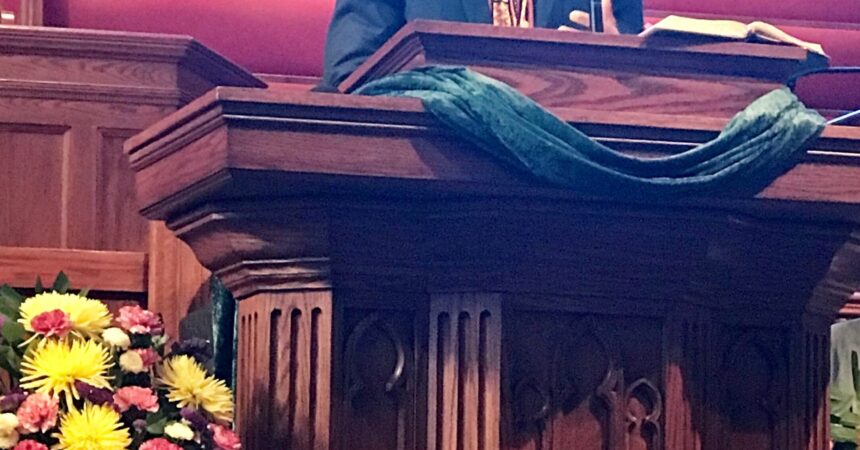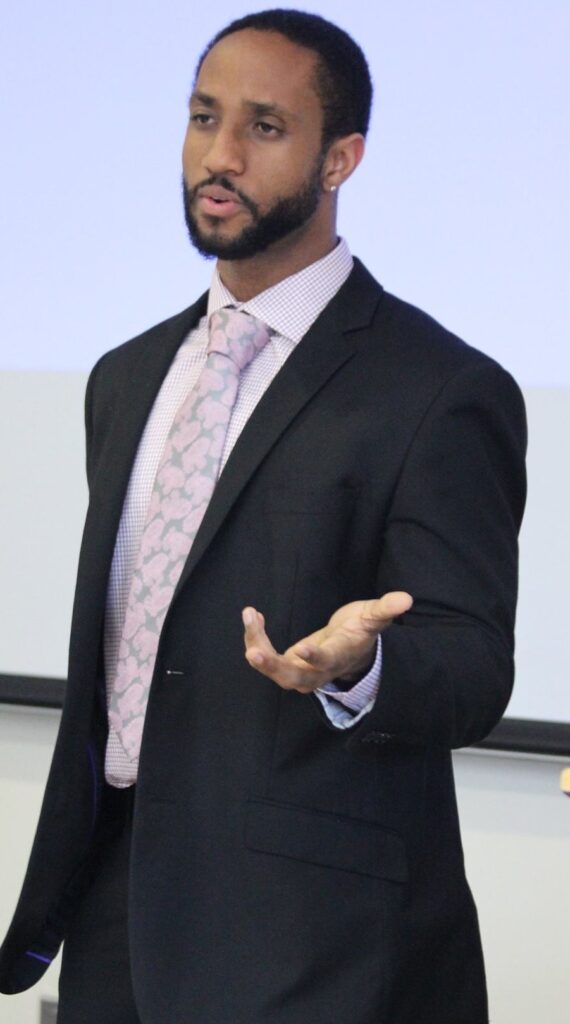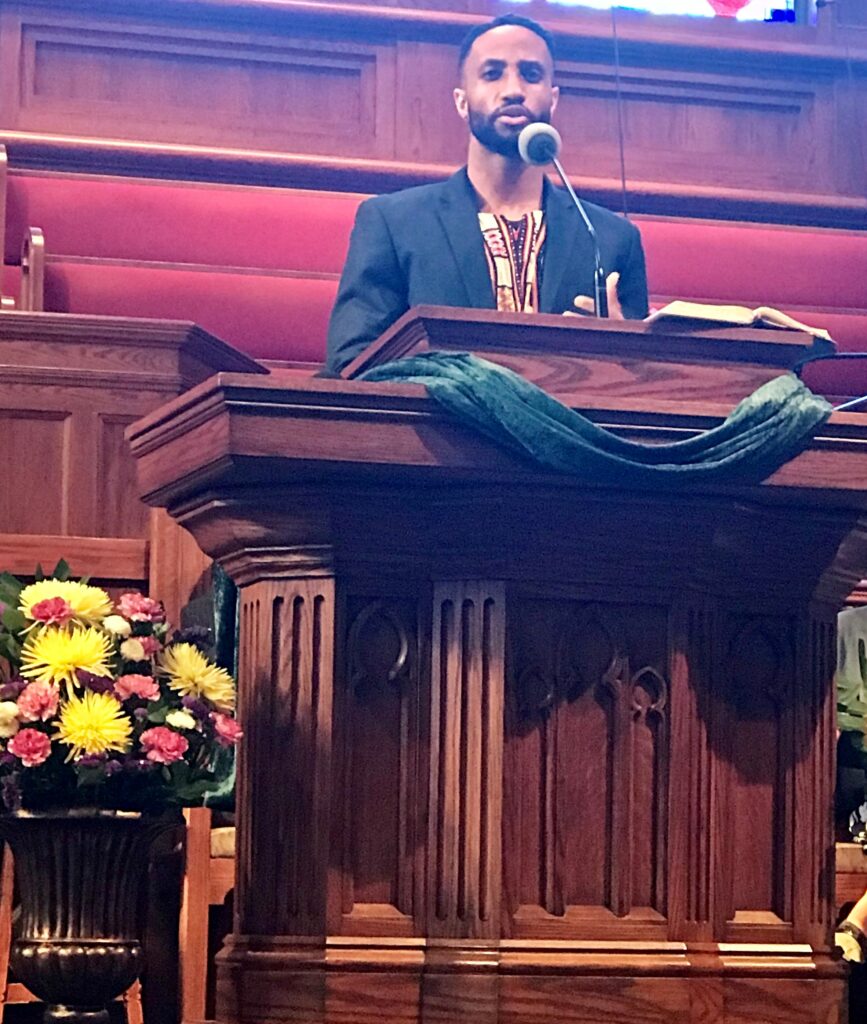
Millennial of the Year
Wright finds successful career path early

Photo submitted

Photo submitted
By St. Clair Murraine
Outlook staff writer
They were typical teenage high school athletes with an attitude that seemingly implied that playing sports was more important than academics.
That was the scenario for James Wright II and his buddy Michael Sacoto when they attended Saint Monica High School in Santa Monica, Calif., about 16 years ago.
The situation came to a head when their grades declined to the point that their parents were summoned to the school. It turned out that the teachers who Sacoto’s sister and Wright’s mother met with were in side-by-side classrooms.
Both parents completed their conferences at the same time, stepping into the hallway where both boys waited. Students were milling around, noticing the obvious embarrassment on the boys’ faces as they were admonished.
What transpired was a remarkable turnaround that put both boys on a life-changing part that is positively impacting their communities.
“That conversation,” said Sacoto, “That moment and that experience changed everything for both of us.”
Indeed. Both are now involved in higher education, although they took different paths.
Wright’s rise was rapid and at age 31 he holds a doctorate degree and is an assistant professor in the Askew School of Public Administration and Public Policy at Florida State University. He also spent last year on the McKnight Junior Faculty Development Fellowship.
Wright’s research at FSU specializes in policing, law enforcement agency management and race.
The work he’s accomplished made him the Capital Outlook’s choice for Millennial of the Year honors for 2020.
“I’m thankful and surprised and I think there are a lot of millennials that are doing great things to better our community,” Wright said, reacting to the honor. “I hope that I can live up to the high honor.”
Wright came to Tallahassee from Washington D.C., where he earned a doctorate degree in public administration and public policy from American University at age 28. By the time he got to FSU, he and his wife Nicole were newlyweds.
Wright’s story might have been different if he didn’t suffer an injury that ended any dream he had of playing football beyond college. He also played baseball and ran track in high school.
He obviously was better in football, as he was recruited by UCLA. But that was rescinded when the coach lost his job. He eventually went to Cal State before transferring to USC, where he made the team as a walk-on before injury ended his quest.
At that time, his childhood friend Sacoto was working his way to becoming a career pathway programmer for students in the Rancho Santiago Community College District in Orange County.
Wright watched the summertime protests over the death of Blacks at the hands of law enforcement officers with a keen eye. He’d lived the experience of some of the victims, although his run-ins with police officers weren’t fatal.
On one occasion, police officers showed up at a party when he was an undergrad student at Southern Cal. The officers were call because of a fight but before they left Wright and others found themselves handcuffed and in some cases people got kneed on their backs.
In another incident, Wright recalled being pulled over in a traffic stop that he found harassing.
The incidents turned out to be the impetus for Wright’s career choice. It was also fueled by his older sister who raised the bar when she became an attorney, he said.
“It made me angry,” Wright said, recalling the incidents between ages 18-22. “I was trying to understand why there was this inherent tension, like racial discrimination going against the Black community from the police organization.”
He knew that strained relationships existed, though. He’d heard from his father, a Mississippi native, about the civil rights era. The causes that people like Angela Davis, Martin Luther King Jr., and Stokely Carmichael fought for inspired him.
The summertime Black Lives Matter protests had plenty of positive effect, but Wright would like to see more than lip service. For instance, the NBA, Major League Baseball and the NFL have taken measure for more diversity and inclusion.
Wright called for more. Ideally he would like to see companies hire Diversity Equity Inclusion officers as well as dedicated more money to HBCUs.
“It’s more than just symbolic gestures,” he said. “You have to put finance behind it, you have to ask for forgiveness for all the injustice you’ve done before and you have people filters throughout the whole organization that care about DEI and everyone is held responsible.”
In addition to his work as a professor, Wright is a licensed minister. Essentially he is walking in the footsteps of his father James Wright, pastor at Rightway Baptist Church in Culver City, Calif.
The decision to become a preacher wasn’t a sure thing until Wright was living in Washington, D.C., while he was in the doctoral program at American University. He had constant dreams of about preaching that led to a conversation with his father.
Within six months, Wright said he was on the pulpit delivering his first trial sermon. He developed a style of preaching that often rings with personal testimony or even humor.
His messages tend to capture a congregation as if he speaks individually to each one in the pews. That goes back to when he and Wright led the young adult ministries at Shiloh Baptist Church, said Antonio McLaren.
“His style is non-threatening, which is a very important part in ministry,” McLaren said. “I believe when you can impart testimony or knowledge to a population in a way that can be received by not being overbearing or intimidating it’s important.”
His style comes from a need to be to be deliberate about relating to a congregation in the right way, Wright said.
“You think about the tradition of the Black church,” he said. “There is a time when you want to shout and there is a time when you want to teach. Since I’m a teacher, my goal is always to leave you with something better than how you came. If there is something I can relate to you to help you get to the next day I want to do that.”







